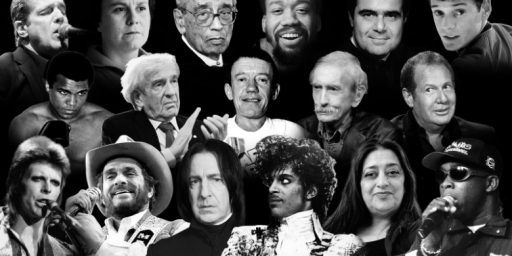Grieving Over Dead Celebrities
We can feel that we "know" athletes, entertainers, politicians, and others that we've followed, rooted for, or whatnot over a period of time and feel a genuine sense of loss when they're gone.
Jonathan Zasloff awards Overstatement of the Decade honors to Andrew Sullivan for declaring, “The untimely death of the great Whitney Houston cannot but provoke intense sadness.”
No.
The deaths of more than 25,000 children in the Somalian famine and brutality cannot but provoke intense sadness.
The ongoing enslavement of 27 million people worldwide, many of them women and girls in sexual bondage, cannot but provoke intense sadness.
The bloody repression in Syria cannot but provoke intense sadness.
(They would also provoke intense anger, but Andrew’s statement isn’t limited to sadness).
Cue George Will, from 1997, on the reactions to Princess Diana’s death:
When it is the celebrity of the deceased that triggers behavior that gets identified as “grief” and “suffering,” what words remain to describe what occurs in, say, a pediatric oncology ward?
Enough. She had a great voice. She sang some really silly songs. She destroyed herself, with an assist entertainment industry culture. That is all.
This is . . . nonsense.
Now, it’s true that I didn’t much give a damn when Diana Spencer was killed in a car crash. And, while I thought the passing of Whitney Houston not only noteworthy but “A tragic waste,” I can’t claim to have been overly broken up about it. It’s sad when young people die but it happens all the time and I don’t get particularly upset about it unless there’s some personal connection.
But people feel sometimes feel intense connections to celebrities. We can feel that we “know” athletes, entertainers, politicians, and others that we’ve followed, rooted for, or whatnot over a period of time and feel a genuine sense of loss when they’re gone.
In his tribute to Houston, Andrew writes, “ don’t know what to say except that I came out to her in her heyday. ‘I Wanna Dance With Somebody’ was my disco favorite back when I went out every weekend in my 20s, and it felt weirdly liberational.” That’s a meaningful connection at a particularly formative period in his life–particularly, one imagines, for a young gay man in an era where being openly gay made him a pariah in his own conservative, Catholic circles. Surely, he’s entitled to “intense sadness” over her death at a young age. (Indeed, if their Wikipedia entries are correct, Houston was born but a day before him.)






I prefer to split the difference. Ms. Houston’s death is sad. All the things Zasloff listed are also sad. What’s _tragic_ is that _none_ of these things will get _anyone_ to change their behaviors one iota.
James, I think most people feel as you do, me included. This is just another example of the increasing worthlessness of our tabloid media. It’s grief created by the media to attract viewers and sponsor dollars. They simply saturate the airwaves and coax cables with manufactured grief.
I’m glad someone said it finally. I woke this morning and nothing but poor Houston still even on the CBC – same as yesterday. I was having déjà vu all over again thinking oh god not another Lady Di extravagance. I’m hoping the out pouring just related to the grammy thingy
The Zasloss response is a perfect example of the logical fallacy that one cannot complain about / mourn / decry X without also complaining about / mourning / decrying Y. Failing to do so apparently makes you a monster and renders the first statement unworthy of a response.
Does anyone know if this fallacy has a name?
I admit I did feel a slight sense of shock when I heard the news, even though I’ve never been a fan of her music and I hadn’t really listened to any of it in almost two decades. I was aware she’d had drug problems, but for some reason her death took me by surprise, and I always find it sad to hear of someone dying young. There’s also the fact that you start to think it’s possible these people were partly killed by their celebrity status, which is an issue in itself.
I agree with de stijl. And Zaslof is the one coming off as a douchebag.
re: Whitney Houston – Best. Superbowl. Anthem. Ever.
http://www.youtube.com/watch?v=llFZT6CTXz8
It’s sad that untimely deaths are used to sell soap. As someone who has battled substance abuse issues, I am always saddened to hear of any life cut short by drug/alcohol use. Xanax is nasty stuff, I was strung out on it myself once upon a time.
That being said, I don’t think Whitney Houston’s life had any more intrinsic value than the life of the next innocent bystander who will die in a drive by shooting. That our society attaches so much value to one life and just about none to another tells us something about ourselves that is not very flattering.
@anjin-san:
No, it just says that we’re human. I care more about the loss of my wife than I do the death of some random stranger across town. I wasn’t a big Whitney Houston fan but care marginally more about her death–because I knew who she was and she was tangentially part of my life–than about that of a random stranger. There are some famous people whose loss, especially at a relatively young age, would affect me more than Houston’s.
@anjin-san:
True, but only in the sense that nothing has intrinsic value; value is an extrinsic property. It’s not like we can definitely measure to value of some object and then go around judging people because they personally value it more or less than the valuemeter says they should. The concept of value only makes sense with respect to a specific person and will vary from person to person.
I hadn’t paid much attention to her, but hearing her sing now, feeling the power of that national anthem, she was special. WWJMS*?
*what would Joni Mitchell say